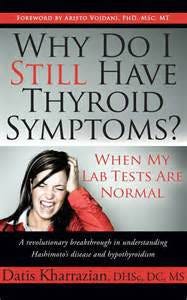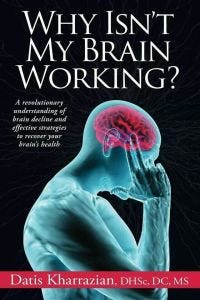What You Need To Know About Brain Fog And Blood Pressure With Thyroid Disease
By Fallon Davis
In the United States, there are approximately 62,450 new cases of thyroid cancer with over 47,000 cases in women and over 15,000 cases in men occur. According to the American Cancer Society 2 out of 3 thyroid cancer cases happen in people under the age of 55 . In another study by Cancer.org, about 1,950 deaths are from Thyroid cancer with more than half of the cases arising in women.

Los Angeles Dr. Datis Kharrazian specializes in brain health and the effects that Hashimotos Hypothyroidism has on a person’s quality of life.
He also is a functional medicine, nutrition researcher and consultant that has a private practice for patients seeking non-pharmaceutical alternatives to manage chronic conditions through diet, nutrition, and lifestyle applications.
Currently, Dr. Kharrazian is currently in a post-doctorate clinical research scholar program at Harvard Medical School and has published two books, “Why Isn’t My Brain Working,” and “Why Do I Still Have Thyroid Symptoms.” Dr. Kharrazian breaks down a couple of common questions affecting someone with brain disfunction and hypothyroidism.
What are three important key components in your book ‘Why Isn’t My Brain Working?’ that you feel are the most important topics you want readers to know?
I feel the most important but most overlooked topics are the everyday things that have a big impact on brain health. One of the most fundamental is blood sugar stability. Many people are causing poor brain health, accelerated brain aging, and mood and memory disorders simply from eating a diet that is too high in sugars and starches. They also skip meals, fuel themselves with caffeine, or overeat. Your brain is highly dependent on stable blood sugar for proper functioning of neurons and brain chemical activity.
Another big dietary culprit is inflammatory foods. These are foods that cause an immune reaction. For instance, the tissue most affected by gluten is neurological tissue. We have seen many people improve brain function simply by going on a gluten-free diet. Often, other foods must be looked at, such as dairy, egg, grains, soy, etc. It’s important for people to follow the autoimmune paleo diet for a while, which you can find on my site at http://drknews.com.
Third, the health of the gut is paramount when looking at brain health. I’ve already talked about two dietary factors, but other things to consider include intestinal permeability, also known as leaky gut; the balance of gut bacteria; gut inflammation or autoimmunity; and function of the vagus nerve, the large nerve that delivers communication between the gut and the brain. Gut function impacts brain function and brain function impacts gut function. This is why people with head injuries often end up with gut problems.

How is the brain affected by hypertension or high blood pressure?
As we know, hypertension raises the risk of stroke. Low blood pressure is also a concern as it means not enough blood is getting pushed into brain tissue. Blood delivers oxygen and nutrients to the brain. When blood pressure is too low, the brain is under fueled in general. Low blood pressure is often connected with low blood sugar and poor adrenal function. Brain oxygenation is an overlooked factor in brain decline. If your nose, your toes, and your fingers are always cold, you need to consider whether your brain is getting enough oxygen. Same if you have chronic nail fungus issues, or cramping in the hands and feet. These can be signs you’re not getting enough blood flow to the extremities and the brain.

Can you briefly explain how people can get “brain fog” from Thyroid Disease?
Brain fog is caused by firing, or communication, between neurons slowing down. This is a problem not only because it slows down mental processing and causes that foggy feeling, but also because inactive neurons are more likely to die. Brain fog can mean accelerated brain degeneration. All cells in the body need sufficient thyroid hormone to function, including brain cells. Also, most cases of low thyroid function are autoimmune, meaning the immune system is attacking the thyroid gland. Unmanaged autoimmunity means system-wide inflammation, including in the brain. Brain inflammation will cause brain fog. Also, studies show the same immune mechanisms that cause autoimmune attack of the thyroid can also cause autoimmune attack in the brain. It’s very important to manage autoimmune hypothyroidism, or Hashimotos, for these reasons.
How can we maintain a healthy brain when dealing with fatigue, depression, memory loss when dealing with Thyroid Disease?
There is no one simple answer or supplement. Ten people dealing with these issues can each have a different cause of their symptoms. You have to look for the underlying mechanisms and address those. I outline that in my book Why Isn’t My Brain Working? I also take readers through a step-by-step approach to unraveling this mystery and addressing it in my upcoming One-to-One video course on brain fog. You can read more about that here: https://drknews.com/one-to-one/.
What are your favorite exercises/games to increase brain function?
Basically, whatever you’re not good at is what you should do to improve brain function. If you’re bad at math, do math puzzles. If you’re good at math but not very creative, take a painting or sculpting class. Maybe you need to do balance exercises. Always keep your brain active by learning new things. And, of course, exercise is paramount to good brain function to increase oxygenation and reduce inflammation. But don’t over exercise, that increases inflammation.
In what ways can blood type affect brain functionality?
That is not a model I follow or endorse. Your diet, lifestyle, immune reactivities to foods and chemicals, your exercise habits, and your stress levels are going to play big roles in your brain health. It’s important to pay attention to those regardless of your blood type.

